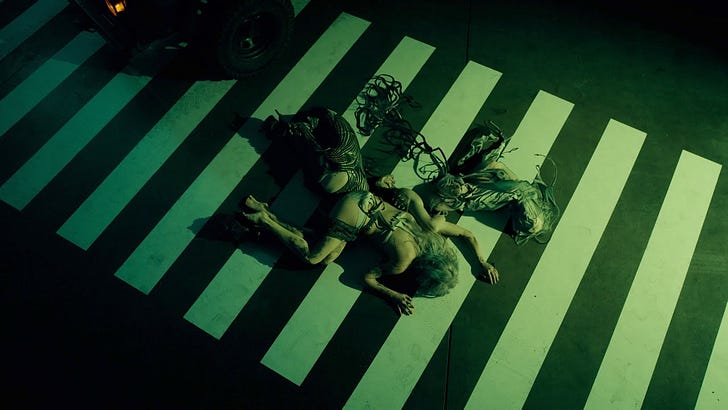"1970s Chinese soul music" + Three-Body Problem rap
+ from “atonal noise” to a Palme d’Or nomination: tracing the history of a pioneering Shanghai band
…And we’re back. Hello and welcome to Concrete Avalanche, a newsletter about music from China. Thanks very much for reading and Happy New Year!
If you’d like to listen to lots of great music from China for free, all in one place, check out the Concrete Avalanche playlists here. Please support the artists if you can.
I also have tip jar running on Ko-fi. Contribute here if you’d like:
In this issue: a Yunnanese singer-songwriter imagines what might have happened if China had had its own Motown in the 1970s, a Three-Body Problem-referencing experimental hip hop record, an electro-punk single calling out the patriarchy, an avant-garde Shanghai band that launched the careers of several significant contemporary Chinese music figures, and lots more.
Southern soul: Yunnanese singer Dizkar imagines a Chinese version of 1970s soul music
Where the US has Leon Bridges and Finland has Bobby Oroza, China has Dizkar. The Yunnanese singer has long toyed with a retro-tinged R&B sound, but on his latest record he’s fully embraced the past with a collection of soulful songs built on “African-American spirituals as the main style” and that sound like they’re from another era. Yet where Bridges and Oroza throwback to a well-recorded English-language musical age, Dizkar claims that “in the Chinese pop market, no complete soul album [has] ever emerged.”
Instead, the Kunming-raised artist’s Fake Soul Music: The Album LP has been “released on December 18th, 1974 in a parallel world”. It’s a record that harkens back to a time that never really existed.
Dizkar spent several years piecing together his imagining of what 1970s Chinese soul could have sounded like, releasing an initial taster as an EP in 2023. Fake Soul Music is the result of him building the idea out further, into a full 13-track album.
In search of that golden soul sound, he and producers Master Yao and CY.S set up their recording space to mimic the layout of the famous Motown Hitsville USA studio, employed “retro sound expert” Allen Parker, and worked with Metropolis Studios’ Felix Davis to master the album using a vintage 1970s two-track tape recorder.
It’s a warm, highly enjoyable listen, with Dizkar’s genuine passion for classic American soul music shining through. The joy is infectious; just watch this music video — for one of the stand-out tracks on the record — and try not to smile:
Musically, the album is at its best when it really goes for it with the classic soul sound, such as on the above track and the one that follows it, ‘Love & Drugs’. Along the way there are lyrics that look to echo some of the genre’s more straightforward hooks (‘All the Time’, for example), but also more poetic moments, as the singer-songwriter tackles timeless tribulations with love and loneliness.
Overall, it’s a fun experiment and certainly something a little different.
Fake Soul Music: The Album is out now.
It’s part of a renewed interest in Bandcamp from Yunnan / Sichuan label Mintone, with their page recently updated to include a whole host of previous releases — worth a browse. (And side note: if you’re interested in soul-adjacent music from 1970s Asia, check out the excellent Soundway compilation Ayo Ke Disco: Boogie, Pop & Funk from the South China Sea (1974-88).)
Late night tales: Hualun’s Rubey Hu releases a beautiful solo work made for nocturnal listening
Late last year, Beijing’s bié Records released a new version of Hualun’s outstanding An Elephant Sitting Still soundtrack (new as in it had new packaging, don’t think they’d done anything to the recordings). For the uninitiated, this is a beautiful soundtrack to an extraordinary film. The re-release reminded me of the last time Hualun (re)issued the soundtrack on vinyl, with demand crashing their website and copies quickly emerging on Taobao at hugely inflated prices (members of the band had some, err, choice words for those resellers and took action to have the listings removed).
The Elephant soundtrack may remain Hualun’s best-known — and most sought-after — OST work, but it’s far from their only wonderfully-judged cinematic accompaniment. Director Yung Chang engaged them for the music to go with his Emmy-nominated documentary Wuhan, Wuhan, which focused on the band’s hometown and, of course, the Covid-19 pandemic. And they also provided a more upbeat score for Li Gen’s Before Next Spring.
Even when they’re not literally producing soundtracks, Hualun’s work often has a cinematic quality to it. This is also true of the solo compositions of Rubey Hu, the band’s Beijing-based synth and keys whizz. His first solo record was an actual film score (for Niu Xiayu’s Virgin Blue and released by bié in early 2023); his second is not. Yet there’s little to choose between them in terms of atmosphere and tone.
Released on January 15th by Slovakian label Music That Shapes — who also put out the excellent Hualun record Homework in Quiet Time — In Different Rooms is a wonderfully contemplative work, driven largely by Hu’s piano. The label’s recommendation that the record is listened to at night is not misplaced.
In part, this atmosphere comes from the record’s mode of creation: in the midst of Covid and China’s rolling lockdowns, Hu took to improvising on his Yamaha electric piano in the evenings. His ‘Night Piano Project’ planted the seeds for what would become In Different Rooms.
Naturally (or naturally for me at least, as something of a Hualun obsessive), there are echoes of Hu’s work with Hualun dotted throughout the record. More than just echoes in fact: Hu’s Hualun bandmates also appear on the album; MK Zhu and Ding Mao both lend more synths to the record, with the former also playing guitar and producing, and the latter playing piano and doing the artwork.
So it’s not officially a Hualun album, but In Different Rooms certainly has a similar feel. And that, of course, is no bad thing at all. Highly recommended.
In Different Rooms is out on January 15th and is available for pre-order now.
Point of no return: sci-fi and historical references combine on inventive hip hop LP Wuhuiyou
“The symptoms of my memory disorder worsen every year, making it hard for me to distinguish between reality and illusion. […] I’ve struggled with this disorder for years, and doctors have been unable to help. All I can do is return to daily life and focus on my doctoral project, which explores the fusion of art music and Chinese rap.”
This is how Tian Fu introduces his album Wuhuiyou (translated as No Return Voyage), which sees him team up with rap collective Treasure Hill (comprised of Sancebai and Jin Tiaozao) for a voyage through sci-fi and ancient history-referencing experimental hip hop.
Lo-fi atmospheric sounds featuring traditional Chinese percussion and some eclectic samples swirl as the trio casually drop lines about mass extinctions, Song dynasty emperors, and “Drinking and composing poetry with a Cowboy of the Stars”. The name of Zhang Beihai, a character in The Three-Body Problem, also pops up at the end.
The rappers’ flows remind me of the exchanges between J-Fever and Zhou Shijue on their series of records with producer Eddie Beatz — often catching you off-guard with clever lines and stop-start deliveries, or, in one instance, by breaking into a bout of whistling.
Tian Fu may “have never been an astronaut or a scientist”, as he states in his introduction, but this is quite the trip.
Wuhuiyou is out now and is only $6 on Bandcamp. And if you’re especially into sci-fi-referencing music, here’s a recently released black metal album themed around 2001: A Space Odyssey.
“Structural violence born from patriarchy is what we resist”: Run! Rabbit Run! tackle femicide in new single
Last summer, electropunk riot grrrl group Run! Rabbit Run! released an EP of covers, featuring takes on tracks by The Stooges, The Ink Spots, and more. At the tail end of 2024, they followed that with a new track entitled ‘Un violador en tu camino’, which deals with themes of femicide.
“The song seeks to explain to society, as well as to women who feel shame for being victims and their families, that it is not the fault of women—not because "they were there," not because "they dressed like that." The fault lies with the perpetrators, with those indifferent to the victims' suffering, and with a society that shields offenders and perpetuates injustice against women.”
You should really go read the band’s full introduction — it’s powerful stuff. They’re careful to frame the song as inspired by events in Latin America, but it’s clear that their statements are highly relevant in other parts of the world too:
“Today, women need more choices and less bondage imposed by traditional ideologies. As they grow, and especially before they become mothers, women must first become themselves—free individuals who understand what they want and how to live their best lives.”
‘Un violador en tu camino’ is out now.
Bust of the year: experimental electronic musician ayrtbh pleases on new LP
If you caught either my end of year mix or the podcast I did for ChinaTalk, you may have noticed the appearance of ayrtbh (Wang Changcun) on both. His Bust Fossil album came out at the end of November on Beijing’s Metasonar label and is the software writer and experimental electronic musician’s most accessible work in a while.
I’ll keep the write-up here short given I’ve already plugged this record on the aforementioned posts, but this is definitely one to check out if you haven’t already — there’s more melody on Bust Fossil than we sometimes get with ayrtbh’s work. As the introductory blurb has it: “refined sounds weave through rhythms and flow seamlessly through time, creating a listening experience that is both richly layered and dynamically resonant”.
Bust Fossil is out now.
Corset hurts: producer Jellyeeee explores the “repression” of social norms on Flourish
Since she was a child, Guangzhou-born producer Jellyeeee (Zitong Li) has studied a range of musical genres from classical to pop, and recently completed a course in vocal studies (with a side of film scoring) at LA’s Musicians Institute. Her YouTube channel features videos of her doing rock covers and performing ‘Frosty the Snowman’ blindfolded, she’s previously collaborated with hyperpop artist Jiafeng, and her debut LP Hemophilia name-checked everything from glitch and Tin Pan Alley to hardcore punk in its description.
It’s perhaps not a huge surprise then that her latest solo record, released via Modern Sky (one of the biggest labels in China and the organisers of the country’s best-known festivals, Strawberry), is something of a grab-bag of influences. Classical music, opera, and musical theatre are referenced on Flourish, which blends crackling, unpredictable electronic beats with horror film and nursery rhyme-ish kitsch.
Modern Sky’s claims that the record is “not only a musical breakthrough, but also a spiritual journey about life, growth and struggle” and one that leads “the audience into a spiritual universe that is both introverted and extroverted” is a little full on for what is effectively an EP, but there are some interesting themes at play on Flourish. With lyrics about “paranoid freaks” and “corsets on fat bodies”, the title track, for example, is billed as a reflection on “inner repression and the desire for freedom”, exploring “the individual’s struggle against social standards [and] the pain and hope that people face in their quest for self-actualisation.”
The record only last 15 minutes, but the ideas and imagery that Jellyeeee manages to cram in during that time make her an artist to watch.
Flourish is out now, and only ~$3 on iTunes.
From “atonal noise” to a Palme d’Or nomination: tracing the history of pioneering Shanghai band Junkyard
Badhead, an indie-leaning spin-off label from Modern Sky, have belatedly made it to Bandcamp in recent months, adding a load of old releases to the site by some of China’s most interesting acts. Late on Christmas Eve, they delivered another present in the form of Total Junk, an album that originally came out in late 2023 but which I didn’t write about here because it was so hard to track down on international platforms.
Spanning 49 tracks, it’s a retrospective of the short but significant output from Junkyard, a no-wave act formed in Shanghai in 2001 and who disbanded just three years later. “Rapid, atonal guitar noise, a synthesizer with no melody, perverted and screaming vocals, and weird sound samples” is how the official Badhead blurb describes their avant-garde sounds, which are often made all the rougher from being recorded as part of rehearsal sessions and live sets.
It’s true, Total Junk is not always easy listening, though it’s also perhaps not quite as wild as that description may make it seem. It traverses a range of styles and — while it is sometimes chaotic — it is far from out-and-out noise. Yet perhaps what’s most interesting about Junkyard is what happened after the five-piece broke up.
The group’s handsome bassist Ma Haiping would go on to become a lynchpin in the Shanghai techno scene through both his own productions (as MHP) and as part of discerning collective VOID, who would bring the likes of Juan Atkins and Robert Hood to the city.
On guitar for Junkyard was B6, another member who would swap out-there experimentalism for electronic music, becoming one of the city’s best-known producers. In addition to a synth-pop project called IGO and multiple solo records, he’s since gone on to craft a number of high profile film and TV drama soundtracks, including for Diao Yinan’s Palme d’Or-nominated The Wild Goose Lake.
Other members included Guo Shiliang (who would work with Top Floor Circus in the beloved Shanghai band’s early days) and Yin Hao, who would go on to form trip hop act Running Blue.
And then there was the drummer, Junky. He would stay closest to Junkyard’s original ethos and sound, forming self-described “harsh as fuck noise” outfit Torturing Nurse. He’s still going as Torturing Nurse to this day in fact, having racked up hundreds of releases and live performances, and having founded a crucial experimental music space in Shanghai called Trigger.
Junkyard was where they all got their start, and Total Junk is a fascinating record of some talented musical minds letting loose and freely experimenting.
Total Junk is out now.
Exit: Loopy
Another key venue on China’s alternative music scene has shuttered. Loopy in Hangzhou was named Resident Advisor’s Club of the Week as recently as late October, but its 2024 New Year’s Eve party was its last.
Founded in 2016, Loopy was a community-building venue that paired alternative electronic music in the vein of Shanghai’s ALL with live rock bands and experimental performances. As RA noted, “Loopy spent three years shaping Hangzhou’s underground club scene before it was forced to close during the pandemic. Since reopening in 2023, it’s taken time to rebuild, reclaiming its position as a key player in the local music culture.”
A short message on the club’s official WeChat account, posted with a picture of a blank calendar, simply thanked those who’d made Loopy what it was over the years before stating that the venue was now closed and wishing everyone a happy new year.
It’s not exactly the start to the year China’s alternative music scene will have been hoping for, but unfortunately Loopy joins the list of smaller, more interesting venues squeezed out by economic pressures and other factors. It’ll be missed.
UPDATE: the space may be no more, but Loopy the brand lives on. First up: two shows in Japan.







Newly re-released ! https://hualun.bandcamp.com/album/an-elephant-sitting-still-an-elephant-sitting-stillsoundtrack
Thanks for the tip on Dizkar, great stuff! Sad to hear Loopy has closed, I had heard of it but never made it there. With quite a few alt-clubs across the country shutting down over the past few years, I’d love to see you do a rundown of the top alternative clubs in China that remain.